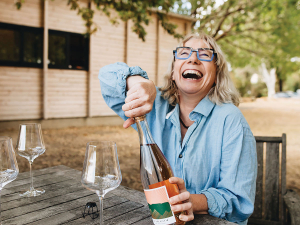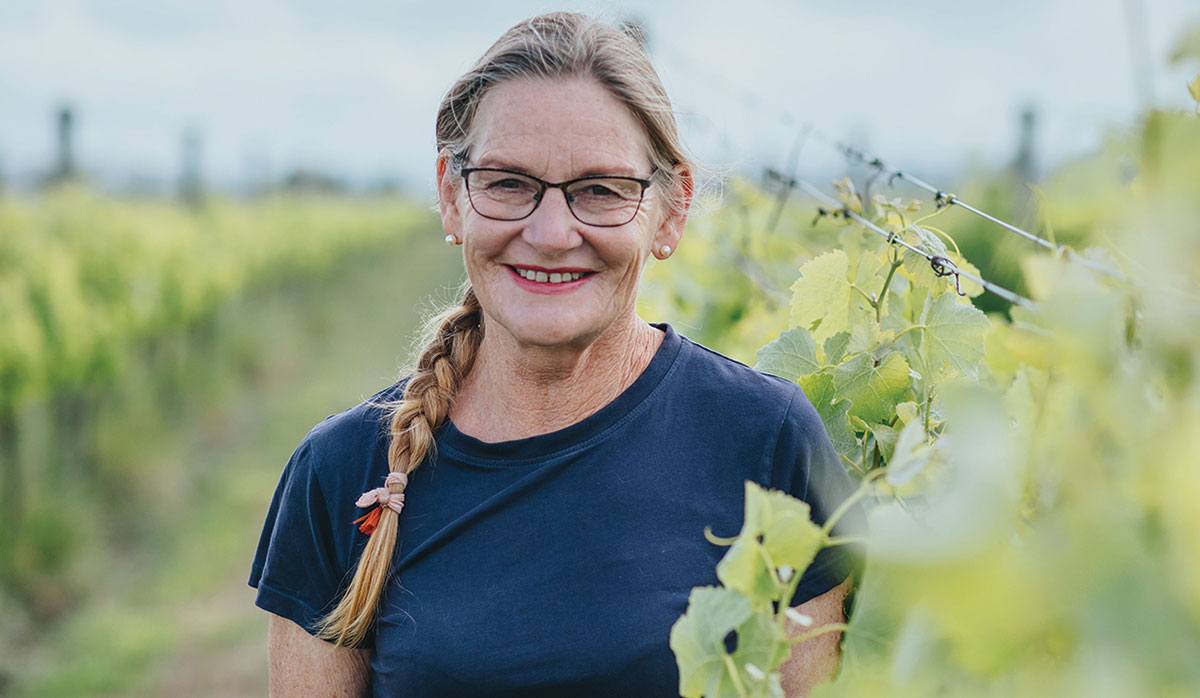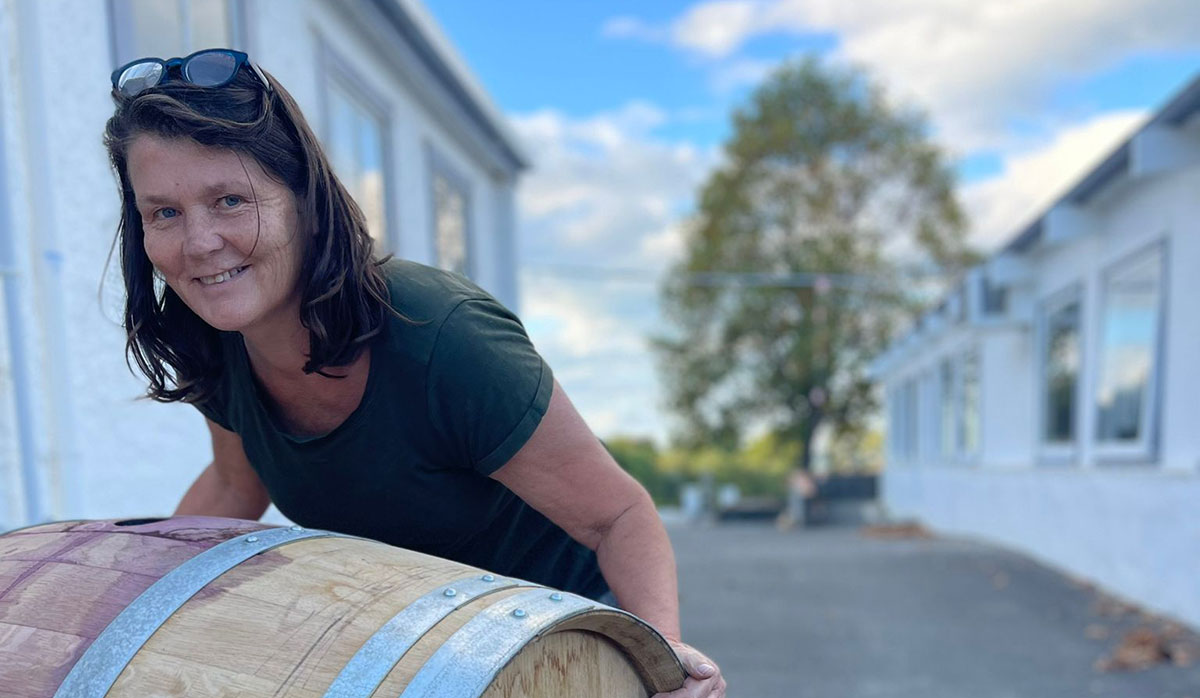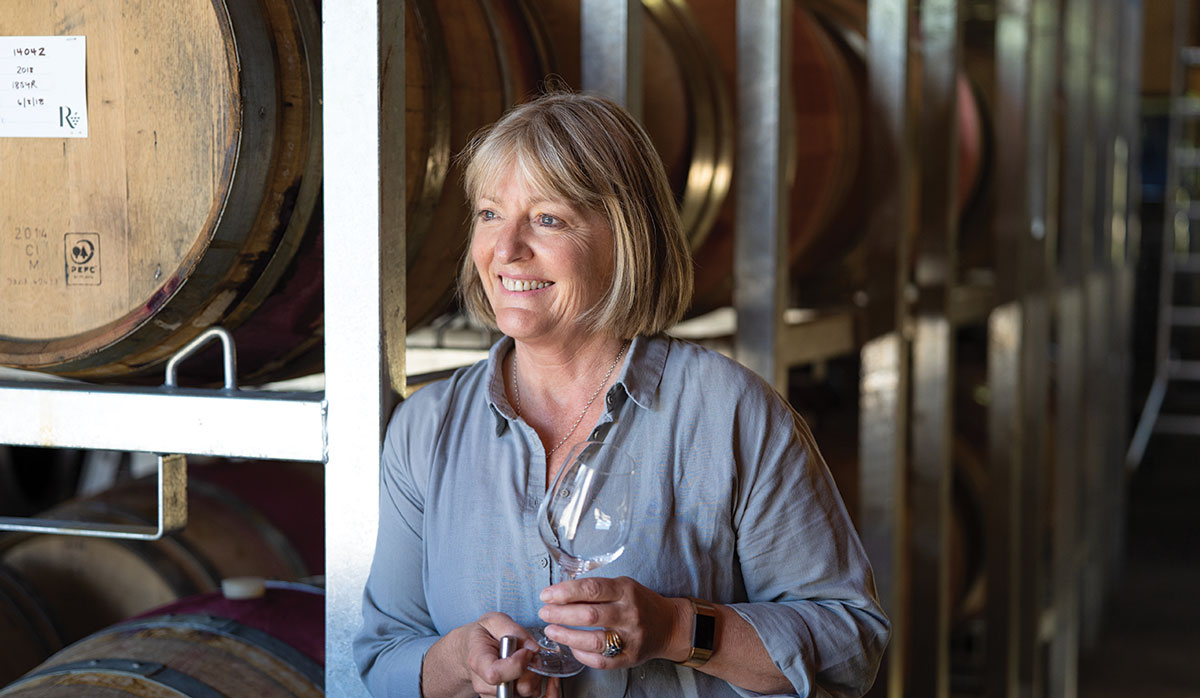Women in Wine: Ashleigh Barrowman’s Path to Siren
When Ashleigh Barrowman landed in Marlborough a decade ago, she was convinced the wine tanks that dotted the landscape were hiding dairy secrets.
 Helen Masters at Ata Rangi. "I'm still amazed that, after all this time, I can often be the only woman in the room at a meeting or wine event."
Helen Masters at Ata Rangi. "I'm still amazed that, after all this time, I can often be the only woman in the room at a meeting or wine event."
New Zealand's wine industry has undergone a significant shift over the past few decades, with increasing numbers of talented women found throughout vineyards and wineries. In celebration of International Women's Day on 8 March, Emma Jenkins MW speaks to five inspiring winemakers who have helped pave the way, thanks to perserverance, passion, and some of New Zealand's best wines.
"Since I started in the wine industry I have wanted to be recognised as a winemaker not a female winemaker," says Jenny Dobson, recalling the derogatory edge to 'female winemaker' when she moved to France in 1979. "As in 'this is a good wine for a woman, but not good enough to compete or in the same league as one made by a male winemaker'."
She was told women couldn't work in cellars because of "funny acids" in their bodies that would turn wine to vinegar, and responded by asking why women could do hard manual labour in vineyards, touching grapes, "if they have funny acids in their bodies". Jenny didn't let baseless superstitions hold her back, going on to become the first female cellar master in Bordeaux, before returning to New Zealand in 1996 to make wine in Hawke's Bay.
For Ata Rangi Winemaker Helen Masters, the physicality of winemaking presented one of the first hurdles. "The winery was set up by tall, strong men, making everything harder than it needed to be for someone of my height," she recalls of arriving at the winery for a gap year in 1991, straight out of college and just 157cm tall. She took over as winemaker in 2003, and the whole of 2004 - when she was pregnant - was reducing the heavy and high lifting, with the likes of hoists and forklifts. "Making it physically easier means we have more time to think and plan without being constantly exhausted."
 |
|---|
|
Jenny Dobson |
Challenges came in many forms in the early days, says consultant winemaker Michelle Richardson, reflecting on an engineer who wallpapered his office with centrefolds, “so when I went in, he’d look past me at them”. Regardless, her early years at Villa Maria, where many notable industry women began their careers, gave her a brilliant start with freedom to experiment. “Grant Edmonds and George Fistonich allowed me to flex my winemaking muscles and provided a wonderful training ground.”
Kate Radburnd, of Radburnd Cellars, was one of New Zealand’s first female winemakers, also starting her career with Sir George, and says she was fortunate to find a support system early on, regarding it as instrumental in later successes. Similarly, Claire Mulholland, from Burn Cottage, describes her entry into the industry as being filled with opportunities to learn and grow, particularly the mentorship she experienced with Grant Taylor and Ted Lemon.
They all agree that the role of women in the industry has evolved over the past 20 years, evidenced by a recent Burn Cottage vintage having an all-female cellar hand team. New Zealand has proven far more progressive than many traditional winemaking countries, thanks to “industry youthfulness”, Kate adds. “We have predominantly educated and talented men and women in viticultural and winemaking roles. In many countries the pathway for women is more challenging and often success is family related.”
Jenny believes industry respect for women is much improved. “The present generation considers it normal to work side-by-side. Positions of responsibility at all levels are now held by women.” That’s reflected in winemaking courses, which are now 50% women, says Michelle. “And the industry is embracing them across all areas.”
Michelle says navigating setbacks taught her resilience, from making suggestions that were ignored until a man suggested them, to juggling breastfeeding during distributor meetings. “This taught me the importance of respectful relationships as well as the value of trust in business dealings.”
While all five women feel that winemaking talent transcends gender, they acknowledge the unique qualities women can bring. “There’s a sense of collaboration, which I think women are very good at, leading to excellent outcomes,” Kate says.
Helen notes that women often excel at day-to-day listening and fine-tuning details, while men are more inclined toward the big-picture. “I really enjoy brainstorming with a group of guys as the ideas are so different and I find that very valuable.”
 |
|---|
|
Michelle Richardson |
Claire notes that sensory perception and attention to detail are sometimes seen as strengths for women, though she stresses that skill and experience ultimately determine success. Jenny sums it up well: “I’m not sure if women have more of these qualities than men, but having both brings balance – which is also the hallmark of great wine.”
Their advice? Work hard, be curious, and don’t let obstacles deter you. “I always knew I was going to be a winemaker so I didn’t see any reason why I shouldn’t be, and that stood me in good stead,” Helen states. “My advice to anyone looking to join the industry is, ‘don’t look for things that you think are stopping you. Find the right people that you enjoy working with and get stuck in, work hard and work in every part of the business’.” Michelle urges women to seek a mentor. “I think I isolated myself too much as I was very much embarrassed about the publicity I got. But now I would say don’t shrink to make others comfortable.” Kate agrees: “Never be afraid to ask questions and always speak your mind. We are sometimes reticent to do that and experience has shown me it is much better to participate and question.”
 |
|---|
|
Kate Radburnd |
As the industry continues to evolve, these trailblazers are optimistic about the future, with Claire applauding the New Zealand industry for being progressive and adapting quickly. Jenny believes it’s about finding balance – between freedom and tradition, and between men and women – and thinks mentoring will play a key role in fostering the next generation.
With ever more women pushing boundaries, initiatives such as the global Women in Wine network help ensure challenges like pay equity and leadership representation are kept front of mind. Meanwhile the stories of strong and inspiring pioneers show that skill, thoughtfulness and a commitment to quality are the true hallmarks of success.

Trade is important to our industry, whether it’s because 90% of our wine sales are in international markets, because of…

The end of the year is fast approaching, so here are some thoughts on a few of the significant developments…
Jimmy Stewart is quite literally chipping away at circularity.
A Wine Marlborough Lifetime Achievement Award is “very premature”, say Kevin and Kimberley Judd, nearly 43 years after they came…
Wine tourism has evolved into a sophisticated, diverse and resilient part of the New Zealand wine sector's economy. Emma Jenkins MW talks…